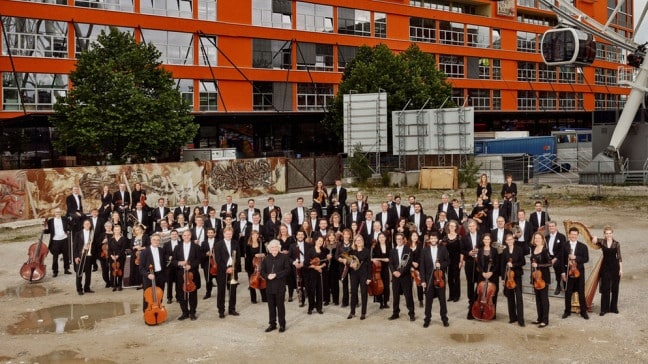Cleveland’s alleged #Metoo trombone loses his other job
mainFrom the CIM:
Dear students, faculty, staff, alumni and Trustees,
As you may know from news reports, CIM’s head of trombone Massimo La Rosa was suspended in September from his position at The Cleveland Orchestra pending an investigation into claims of sexual misconduct.
This morning, as part of our own internal investigation, we suspended Mr. La Rosa from his CIM teaching duties until our investigation is concluded.
If you have information that may be helpful to this process, please contact one of the Title IX committee members, who are:
David Gilson, Associate Dean for Student Affairs (david.gilson@cim.edu | 216.795.3163)
Brian Sweigart, Senior Associate Dean (brian.sweigart@cim.edu | 216.791.4440
Tammie Belton, Director of Human Resources (tamatha.belton@cim.edu | 216.795.3119)
Maddi Lucas Tolliver, Interim Executive Director of Preparatory and Continuing Education (madeline.lucas@cim.edu | 216.795.3204)
If you have concerns to report or would like to access counseling resources, please visit this section on our website for more information, including CIM’s Title IX & Sexual Harassment Policy.
The Dean’s office is already working with CIM faculty and has communicated to our trombone students that Randall Hawes will lead the trombone studio on an interim basis. Mr. Hawes is CIM’s professor of bass trombone, distinguished bass trombone of the Detroit Symphony Orchestra, and a consummate artist and pedagogue.
Paul W. Hogle
President | CEO







Please note that this title is inaccurate and sensationalistic.
The memo issued clearly reads: “…as part of our own internal investigation, we suspended Mr. La Rosa from his CIM teaching duties until our investigation is concluded”.
I would respectfully request that restraint be used when reporting such items to avoid further damage should the person be proven to be innocent.
Perhaps it would be important to note that Mr. La Rosa filed a lawsuit for defamation against his accusers as well as asking for a full-investigation (unlike a recent Supreme Court nominee).
I believe that if a person is guilty of such accusations, they would not proceed in this way.
Thank you in advance for your consideration of the need for accurate and respectful reporting.
If someone is suspended before an investigation is complete, it also means someone is being punished before an investigation is completed and before it has been demonstrated that punishment is warranted. That just seems wrong to me.
For allegations of sexual impropriety, suspension during an investigation is more than reasonable considering the ramifications if the person is found guilty. You can’t take chances with someone who is potentially creating an unsafe environment, especially with students
Also, La Rosa can ask for a full-investigation (and that’s obviously being done anyway without his request), but the lawsuit he filed against Abbie Conant and Jonathan Allen is old news and was dismissed, and neither of them were an accuser. He did not go after the actual accuser from the University of Iowa, even after she filed a police report and named him to “Inside Higher Ed.” Curious that he would try to sue a couple of people he never tried to sexually assault, but not the person who actually made the allegation in the first place.
The case was “dismissed” after mediated settlement. Someone posted the link to the court docket on a previous thread. The entire lawsuit was available for your reading pleasure as well. Perhaps you should fully inform yourself, then pontificate.
The inside higher ed article quotes William Osborne, blogger/blabber/self righteous expert extraordinaire —and husband of Abbie Conant.
Er…no. It just means there are grounds for believing the claims might be true, in the sense they need to be investigated.
And just yesterday we were slagging off major American papers for their headlines about the Lyric Opera strike…
Think of all the guys who paid a lot of money to attend CIM to study with the principal? They should have the right to at least take lessons with him off campus. Lessons with a bass trombone in a second tier orchestra? C’mon, fly in a top tier principal at least.
Mick, Randy Hawes is an amazing player, and the Detroit Symphony is not a second tier orchestra. The students will do great with Randy, and I know firsthand what an amazing player and teacher he is. Principal trombone doesn’t mean “best trombone.” It’s just a title of a job.
A truly outstanding orchestral bass trombone player on the west coast, said in an interview that of all the brass players he has taught (trumpets, tubas trombones), he has had the least success with tenor trombone. So, this solution is maybe not quite the slam dunk that are conjecturing.
There are a lot of trombonists that would give there eye teeth to study with Randy Hawes, tenor or bass. He is regarded as one of the absolute best players and teachers in the business.
Being in a “top tier” orchestra is not the only criteria real musicians and people who know what they are talking about use to judge a player or teacher.
One of the greatest teachers of the trombone who ever lived was Emory Remington, who taught at Eastman school of music for many years. He never payed in a “top tier” orchestra himself, but yet he was a brilliant pedagogue that turned out a whole generation of players who did.
And for the record, Detroit is hardly a “second tier” orchestra.
Maybe we have a different number of orchestras in our top tier. I will grant you that if there are 15 or more orchestras in your top tier than Detroit is a top tier orchestra.
THERE CAN BE ONLY FIVE
If we’re going to put Detroit in the top tier, where do you stop? Atlanta? San Diego? Indianapolis? Colorado? Seattle? The top tier would be limitless
I think the idea is that, as orchestras get better overall (hardly a surprising development since not there aren’t enough jobs in the traditional “Big Five” to accommodate all the young hotshots being cranked out by conservatories), more orchestras are reaching the level of technical & artistic proficiency that only a few orchestras could reach 50 (or 30) years ago, and many, many orchestras have surpassed the level of fabled orchestras in their fabled primes. (Many people are unable or unwilling to believe that. The Boston Symphony’s greatest days will always be those under Koussevitzky; ditto for Chicago/ Reiner, Cleveland/ Szell, etc. I call it “Babe Ruth syndrome:” he’s the greatest, and always will be. End of conversation.)
The number of Really Good Orchestras in the US has grown to much more than 5. I’d say if you heard a recording on the radio — or better yet, a live performance — by Cincinnati, Detroit, Pittsburgh, Atlanta, Houston, Minnesota, Los Angeles, San Francisco, St. Louis, Baltimore or Washington D.C., you’d be hard pressed to say how they were worse than one of the traditional Big Five.
You might even be surprised by San Diego, Indianapolis, Colorado, or Seattle.